Main CPGW Record
Surname: KNOWLES
Forename(s): Hedley
Place of Birth: Skipton, Yorkshire
Service No: ---
Rank: Lieutenant
Regiment / Corps / Service: Duke of Wellington’s (West Riding Regiment)
Battalion / Unit: 1/6th Battalion
Division: 49th (West Riding) Division
Age: 22
Date of Death: 1915-05-30
Awards: ---
CWGC Grave / Memorial Reference: V. C. 18.
CWGC Cemetery: RATION FARM MILITARY CEMETERY, LA CHAPELLE-D’ARMENTIERES
CWGC Memorial: ---
Non-CWGC Burial: ---
Local War Memorial: SKIPTON – ERMYSTED’S GRAMMAR SCHOOL, YORKSHIRE
Local War Memorial: SKIPTON, YORKSHIRE
Additional Information:
Hedley Knowles was the son of Marmaduke Redmayne and Elizabeth Morton Knowles, née Summerskill. Marmaduke was born at Kirkby Malham, Yorkshire and Elizabeth at Newcastle upon Tyne, Northumberland. Hedley was the cousin of Lieutenant John Knowles (11/783) (q.v.).
1901 Skipton, Yorkshire Census: 17, High Street - Hedley Knowles, aged 8 years, born Skipton, son of Marmaduke R. and Elizabeth M. Knowles.
1911 Skipton, Yorkshire Census: High Street - Hedley Knowles, aged 18 years, born Skipton, son of Marmaduke Redmayne and Elizabeth Morton Knowles.
Hedley attended Gresham's School, Holt, Norfolk and is commemorated on the Roll of Honour there.
British Army WW1 Medal Rolls Index Cards: T/Lieut Hedley Knowles, 1/6th West Riding Regiment. Theatre of War first served in: 1 - France. Date of entry therein: 14 April 1915. Correspondence: Mr R. Knowles Esq The Arches, Skipton in Craven.
A short biography of Hedley is included in: ‘A Grammar School at War – The Story of Ermysted’s Grammar School during the Great War’ by Steven Howarth (2007).
See also:
‘Guiseley Terriers: A Small Part in The Great War – A History of the 1/6th Battalion, Duke of Wellington’s (West Riding) Regiment’ by Stephen Barber (2018).
Photograph of officers in CPGW book (page 44).
Data Source: Craven’s Part in the Great War - original CPGW book entry
View Entry in CPGW BookEntry in West Yorkshire Pioneer Illustrated War Record:
KNOWLES, Lieut. Hedley, 6th Duke of Wellington’s, only son of Mr. and Mrs. M.R. Knowles, High Street, [Skipton], aged 22, killed with trench bomb in France May 30, 1915.
---
Click the thumbnail below to view a larger image.
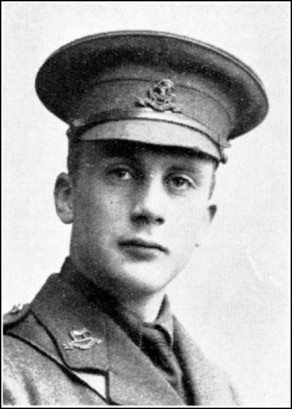
Lieutenant Hedley KNOWLES
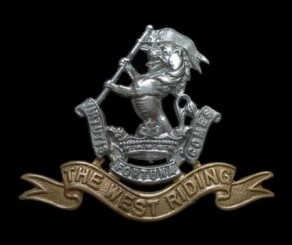
Regiment / Corps / Service Badge: Duke of Wellington’s (West Riding Regiment)

Divisional Sign / Service Insignia: 49th (West Riding) Division
Data from Soldiers Died in the Great War 1914 - 1919 Records
Soldiers Died Data for Soldier Records
Surname: KNOWLES
Forename(s): Hedley
Born:
Residence:
Enlisted:
Number:
Rank: Lt
Regiment: Duke of Wellington's (West Riding Regiment)
Battalion: 6th Battalion (Territorial)
Decorations:
Died Date: 30/05/15
Died How: Killed in action
Theatre of War:
Notes:
Data from Commonwealth War Graves Commission Records
CWGC Data for Soldier Records
Surname: KNOWLES
Forename(s): Hedley
Country of Service: United Kingdom
Service Number:
Rank: Lieutenant
Regiment: Duke of Wellington's (West Riding Regiment)
Unit: 1st/6th Bn.
Age: 22
Awards:
Died Date: 30/05/1915
Additional Information: Son of Marmaduke Redmayne Knowles and Elizabeth Morton Knowles, of The Arches, Skipton.
---
View Additional Image(s)
Additional Photo(s) For Soldier Records
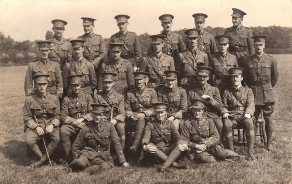
Officers of the 1/6th Bn Duke of Wellington's (West Riding Regiment) in 1915
Back row, left to right: –, –, –, Lieut. E.J.C. Supple, –, – Second row, left to right: –, –, –, –, Lieut. A.E.K. Slingsby, Lieut. H. Knowles, – Third row, left to right: –, –, –, –, –, –, – Front row, left to right: –, Lieut. C.H. Petty?, –
Courtesy of Roger Bancroft
View Craven Herald Articles
View Craven Herald Articles

11 December 1914
PROMOTIONS
The following were gazetted last week:– 6th Battalion the Duke of Wellington’s West Riding Regiment:– Lieutenant C. H. Sarsby to be captain temporarily; Second-Lieutenant H. Knowles to be lieutenant temporarily; Supernumerary Lieutenant W. A. Mackenzie is absorbed into the establishment; Second Lieutenant E. J. C. Supple to be lieutenant temporarily.
04 June 1915
KNOWLES – May 30th 1915, accidentally killed while serving with the British Expeditionary Force in France, Lieut. Hedley Knowles, of the 6th Battalion Duke of Wellington's West Riding Regiment, only son of Mr. Marmaduke Redmayne Knowles, solicitor, and Mrs. Elizabeth Morton Knowles, of The Arches, Skipton, aged 22 years.
04 June 1915
The Late Lieut. Knowles
Many homes in Craven are, in common with other parts of the country, mourning the death of fathers and sons in the fighting line in Flanders. Several of our brave fellows in Skipton and the immediate district have already given themselves to the country for their country's good. They have died in a glorious cause - the cause of national righteousness and national honour. We all hate the necessity for the sacrifice of life that has so far been entailed, but we all realise that there is nothing but sacrifice needed if we are to preserve our freedom-loving country from “being over-run by a hateful and barbarous foe.” It was this view that induced the young men of Skipton, of whom Lieut. Hedley Knowles was one, to respond to the call of their King and Country in the early days of the war: it is for this cause that Lieut. Knowles has given his young life. Full of pluck, imbued with that fine British spirit which realises his duty and does it, Lieut. Knowles, whose death we record with deep regret, accompanied his regiment a few weeks ago to a position near the firing line in Flanders. It was while instructing his men in the art of bomb throwing that one of them, of apparently defective construction, burst, and inflicted such injuries as resulted in instant death. Those who knew him will thoroughly agree with his Commanding Officer's description of Lieut. Knowles as a ‘thorough sportsman.’ With the rod, the gun, or the golf club, he ever played the game for the game's sake, just as he has played his country's game for his country's sake. Words are feeble on these occasions to convey the thoughts that lie deep down in the heart, but we are but echoing the sentiments of our readers in assuring Mr. and Mrs. M. R. Knowles that the deepest sympathy is felt for them in this their hour of bitter trouble in the loss of an only son, who was a credit to his parents, his upbringing, the legal profession which it was intended he should follow, and the town of Skipton, where he was born.
Details concerning the unfortunate event will he found on page 2 of this issue.
04 June 1915
SKIPTON OFFICER ACCIDENTALLY KILLED – LIEUTENANT HEDLEY KNOWLES
Late on Tuesday evening Mr. M.R Knowles, solicitor, The Arches, Skipton, and clerk to the Skipton Rural District Council, received an intimation that his only son, Lieut. Hedley Knowles, of the 6th Battalion Duke of Wellington's West Riding Regiment, had been accidentally killed. The sad news was conveyed in a message from the Territorial Records Officer, York, which was in the following terms:– “Regret to inform you that Lieut. H. Knowles was killed accidentally on May 30th. Lord Kitchener expresses his sympathy.”
The following morning Mr. Knowles received a letter from an officer holding high command in the regiment which gave further details of the painful occurrence. It was in the following terms–
6th Duke of Wellington’s Regiment, France
“Dear Mr. Knowles, – I am very sorry indeed to have to tell you that your son was killed yesterday and died about 6 p.m. He was instructing at the school of bomb throwers and was killed owing to a premature explosion when a rifle grenade was fired. He was hit in the head and death was practically instantaneous. There was no carelessness on the part of anybody, and the accident must have been caused by some defect in the bomb.
"We are greatly grieved, and he was a great favourite with both officers and men. Quiet, unassuming, there was no better officer in my regiment, and none who took a greater interest in his work. He was an excellent soldier and a thorough sportsman. He knew no fear, his only wish being to serve his King and Country for which he has now given his life. We are all proud to have his name on our Regimental Records and we offer to you and Mrs. Knowles our very deep sympathy, and, believe me, it is equally shared by all who know him.”
Lieut. Knowles was only 22 years of age. His connection with the 6th Battalion Duke of Wellington's dates back to 1913 when he was gazetted Second Lieutenant. His first camp was that at Marske last year, when the manoeuvres were interrupted by the mobilisation of the Territorial Force following Germany's declaration of war. He left with the Battalion for Immingham and has since been in training at Healing, Riby, and Doncaster. Lieut. Knowles was a thoroughly capable and conscientious officer who won for himself not only the commendation of his superiors in rank but also the goodwill of his men. Four days after the arrival of the Battalion in France, some six weeks ago, Lieut. Knowles had his first experience of the trenches and the following day took in his men. From that time he appears to have been attached to the school of bomb throwers, having occasionally made brief reference to his work in this connection when writing back.
Prior to the mobilisation of the Battalion, Lieut. Knowles acted as secretary to the local companies of the National Reserve, taking over the duties from his father, who occupied the position when the movement was inaugurated. Lieut. Knowles was intended for the legal profession and was studying for his final examination when hostilities commenced on the Continent.
The remains of the brave lad were interred with reverence in the cemetery at Fleurbaix in the presence of the officers and men, and a plain cross, inscribed with his name and regiment, marking the last resting place.
Mr. and Mrs. Knowles and Miss Knowles have the heartfelt sympathy of the district with them in their hour of sorrow.
The family have received so many touching letters of condolence and sympathy that it is impossible at present to reply to them individually, and Mr. Knowles asks us to thank the writers for their kindness especially one who signs herself “a Mother.”
11 June 1915
SKIPTON UNION, BOARD OF GUARDIANS – THE LATE LIEUT. KNOWLES
Before commencing the ordinary business, the Chairman said it was his painful duty to ask the Board to pass a vote of sympathy with Mr. Knowles and family in the loss they had sustained by the accidental death of their son, Lieut. Hedley Knowles, while serving with his regiment in France. With others he was engaged firing bombs, and was the one to take observation. It was pretty clear that one of the bombs burst before its time, and Lieut. Knowles was injured in the head, knocked insensible, and never regained consciousness. Three of those who were with Lieut. Knowles at the time were very badly injured, but not unconscious, and the fact that these men immediately said “Look after him; never mind us,” would give the Board some idea of what the young officer was thought of. He died the same evening as the accident, and was given a soldier's funeral the following day. Mr. and Mrs. Knowles had told him (the Chairman) they were proud to be the parents of an officer who died for his country. Lieut. Knowles was known to most of them. He was a true sportsman and certainly knew no fear. He (the speaker) was sure the members of the Board would agree that Lieut. Knowles had died a noble death and would offer all the sympathy they could to the father, mother, and sister.
Mr Speak seconded the motion, which was supported by Mr. W. A. Procter. The latter said he had known Lieut. Knowles since his boyhood, and always found him a most gentlemanly and fine fellow. He was sure Mr. Knowles had lost a dutiful and promising son, and the country a good soldier, while he, personally, felt he had lost a friend.
Mr. Martin, on behalf of the officers, associated himself with the resolution of sympathy, which was carried by the members rising in silence.
11 June 1915
The Late Lieut. Knowles
In the course of his sermon at the Skipton Parish Church on Sunday morning last the Ven. Archdeacon Cook made a brief reference to the death of Lieut. Hedley Knowles, and expressed the sympathy of the congregation with the bereaved family. Included in the hymns were ‘Thy will be done,’ and ‘Brief life is here our portion.’
11 June 1915
The Late Lieut. Hedley Knowles
A letter written by an officer who was with Lieut. Hedley Knowles at the time of his fatal accident (recorded in last week's Herald) gives the exact circumstances under which the sad affair took place. We give the facts to set at rest any idea that may have been entertained that the young officer was in any way guilty of carelessness in his performance of duty.
The deceased, accompanied by an officer (with whom he had lived alone for the previous five weeks), and four men, went to a place where they were accustomed to throw live bombs and to fire rifle grenades from a stand that they had invented. “We were seeing what range we could get at certain angles. Everything went off well until the very last one we were going to fire. All, except two privates, got down into the trench in case any missiles flew back, then one of the men fired the grenade, and there was an awful explosion and noise. I was dazed for a minute, but not hurt, but poor Knowles, who was in the trench behind me (not a foot away), was hit. He was never conscious. He never spoke, though I thought he heard me speak to him at the very beginning, but the doctors say it was improbable.”
Three of the men were hurt, two of them badly. They both exclaimed when help was summoned, “We are all right, see to Mr. Knowles; we can wait.” The officer adds in his letter that “the accident was not the fault of any person; but was a mechanical defect in the grenade. The Grenade Co. behaved splendidly at the funeral, and everything was done decently and in order. The General and Brigade-Major were present, as also the Colonel and a few officers – the rest were in the trenches.”
18 June 1915
LETTERS FROM THE FRONT: THE LATE LIEUT. KNOWLES – A SOLDIER'S APPRECIATION
Writing from ‘somewhere in France’ on the 12th inst., a well-known local private in the 6th Duke of Wellington’s West Riding Regiment, says (inter alia):– “You will by now have heard about Lieut. Knowles. It was a very sad business. He was one of our most capable lieutenants, and it is such men as he that a Battalion out here can't afford to lose. We have had a few thunderstorms this last day or two, after a week or two of tropical heat, but the weather soon clears up after these storms.”
Sergt. A. Pryke, of Skipton, writing to his parents, makes the following reference to the late Lieut. Knowles:– “He was a fine soldier and a credit to the British Army. His father and mother ought to be proud of him. We felt his loss very much indeed. He was always looking after his lads; always thinking of them first. His heart and soul was in the army and its work, and he would have made a name for himself if he had not gone under. But such things cannot be helped; we are getting used to them by now.”
02 July 1915
SKIPTONIAN WITH MEDITERRANEAN FORCES
Writing under the date of June 18th, to Mr. C. Horne, the hon. secretary of the Skipton Football Club, acknowledging cigarettes sent by the club to its members on active service, Private W.J. Bell, a former Skipton footballer, and now of the Motor Transport Section of the Army Service Corps, Mediterranean Expeditionary Force, states:– “I was pleased to hear that the Committee had not forgot the boys. A good cigarette is hard to get, and it is as bad here as in France. I was sorry to hear of the death of Mr. Knowles’ son, and I felt how he was becoming a good officer. I think Alf Clarke will by now have got used to blowing his instrument; and when the football season starts he will be able to last two eighty minutes. You must tell Greenwood that he will have to put a little more pluck into his men, and fancy being beaten by ten wickets by King Cross after beating Keighley the day previous.
I was sorry to hear of the death of Fred Cartman, and also of Tom Sheldon having his leg taken off. I can tell you it is d-----ish hot out here, and they say that last Tuesday was the hottest day we have had for forty years. You have heard the song about the burning plains of Egypt, and they don’t half burn. It does not half fetch the sweat out of us, and I am nearly a grease spot now. Still I am in the best of condition, and we have a good billet on the seafront.”
04 August 1916
SKIPTON GRAMMAR SCHOOL – The Roll of Honour
At their day of all days did they think with pride and love of those who – some of those so recently in their midst playing their games, sharing their work, living their life, learning their ideals – had carried these ideals on to the field of battle to fight for King and Country as once they fought for their school. It was impossible to give them a full list of all old boys who had joined the Colours, but they owed it to the memory of these heroes of the Skipton Grammar School who had so willingly given their lives to the Empire to do public honour and reverence to their names.
The following old boys and masters had died on active service:–
Lieut. C. W. Brown, Sergt. J. Cockerill, Second-Lieut. H. Colley, Major M. T. Cookson, Lieut. H. Knowles, Second-Lieut. J. C. McIntyre, Lieut. E.J.C. Supple, Pte. F. Thornton, Second-Lieut. Ian Wilson
Let their example, and the example of all their sons who had so freely responded to their country’s call, be the dominant thought in this their day of thanksgiving. God give them grace to keep the tradition that they had made for them.
04 July 1919
PEACE SUPPLEMENT TO THE 'CRAVEN HERALD' – CRAVEN'S FALLEN OFFICERS
LIEUTENANT H. KNOWLES
6th Battalion Duke of Wellington’s Regiment, son of Mr. M. R. Knowles, solicitor, The Arches, Skipton. Accidentally killed in France May 30th, 1915, aged 22 years.
View West Yorkshire Pioneer Articles
View West Yorkshire Pioneer Articles

04 June 1915
KNOWLES – May 30th somewhere in France, Lieut. Hedley Knowles, of the 6th Battalion, Duke of Wellington’s West Riding Regiment, only son of Mr. and Mrs. M.R. Knowles of Skipton, aged 22.
04 June 1915
SKIPTON OFFICER KILLED – LIEUT. HEDLEY KNOWLES
Skipton learned the painful intelligence on Wednesday of this week that Lieut. Hedley Knowles, of the 6th Battalion West Riding (Duke of Wellington’s) Regiment, the only son of Mr. M.R. and Mrs. Knowles, of High Street, Skipton, has died in France as a result of an accident whilst the unfortunate young officer was handling a trench bomb. Lieut. Knowles was only 22 years of age.
The sad news first reached Skipton at 10.30 on Tuesday evening, the following telegram being received by deceased’s parents:– “Territorial Records Office, York. Regret to inform you that Lieut. H. Knowles was killed instantly on 30th May. Lord Kitchener expresses his sympathy.”
The following morning Mr. and Mrs. Knowles received a letter from the military authorities as follows:–
“Dear Mr. Knowles, I am very sorry indeed to have to tell you that your son was killed yesterday and died about 6 p.m. He was an instructor to a school of bomb-throwers, and was killed owing to a premature explosion when a rifle grenade was fired. He was hit in the head, and death was practically instantaneous. There was no carelessness on the part of anybody, and the accident must have been caused by some defect in the bomb.
“We are greatly grieved, as he was a great favourite with both officers and men, quiet and unassuming. There was no better officer in my regiment, and none who took a greater interest in his work. He was an excellent soldier and a thorough sportsman. He knew no fear, his only wish being to serve his King and country for which he has now given his life.
“We are all proud to have his name on our regimental records and we offer to you and Mrs. Knowles our very deep sympathy, and believe me it is equally shared by all who knew him.”
A POPULAR OFFICER
As the above makes abundantly clear, the late Lieut. Knowles was an exceedingly popular officer. His military career, just ended so tragically, began about two years ago, when he joined the aforementioned battalion as a Second Lieutenant. He did not attend the 1913 camp, but last July was with his battalion at Marske-on-Sea, when a sudden return to the Skipton headquarters was rendered imperative by the outbreak of the war. Since then he had trained with his battalion at Immingham Docks (near Grimsby), Healing, Riby and subsequently at Doncaster, where the preparations for active service were completed. It is only about six weeks since the battalion left for France – on Wednesday, April 14th to be exact – and on the following Sunday Lieut. Knowles entered the trenches with other officers for the first time. Latterly his work appears to have been confined to a bomb-throwing school, work, alas! equally as dangerous as that in the actual firing line.
Lieut. Knowles, like his esteemed father, was well known in Skipton. He received his scholastic training at Skipton Grammar School and Gresham’s School, Norfolk, and subsequently entered his father’s office at Skipton, where he studied law. Since the formation of the local branch of the National Reserve he had acted as secretary. Of a bright and gentle nature, he was in addition to a general popularity held in very high respect by all with whom he had contact, an engaging manner gaining for him many friends and acquaintances.
A FLOOD OF SYMPATHY
Mr. and Mrs. Knowles have received several other letters of sympathy from their late son’s fellow officers, including Lieut. Col. John Birkbeck (officer commanding), Major North, Lieut. Anthony Slingsby and Lieut. M.C.M. Law; also a message of warm condolence from the Brigade General – General Brearton. A large sheaf of correspondence expressing sympathy has also been forwarded by numerous friends of the parents and the deceased officer, among them being communications from Sir John and Lady Horsfall, Mr. W.A. Brigg (Mayor of Keighley), etc.
General Brearton wrote:– “I had a very high opinion of your boy. He was a most excellent and efficient officer, and had he been spared I am sure he would have made a name for himself. He was a thoroughly nice lad, and I deplore his loss. As far as possible he received a full military funeral. As many brother officers as could be spared from the trenches attended, with the men of the bombing class, and a small detachment of the Royal Artillery.”
The body was laid to rest in an orchard at Fleurbaix, a plain cross bearing his name and that of his regiment marking the spot.
Mr. and Mrs. Knowles and their daughter take the earliest opportunity of thanking all those who have written such kind letters of sympathy in their sad bereavement. Especially would they like to thank ‘A Mother’ (anonymous) for her beautiful letter. They hope in due course to reply to them individually.
11 June 1915
THE LATE LIEUT. KNOWLES – Sympathy from Skipton Board of Guardians
Before the business of the Skipton Board of Guardians commenced on Saturday, the Chairman remarked that it was his painful duty to ask them that morning to pass a vote of sympathy with Mr. and Mrs. Knowles and Miss Knowles in the great loss they had sustained by the death of their son, Lieut. H. Knowles, through an accident. He was with several others engaged with firebombs, and he was the one to take observations. It was pretty clear that one of the bombs burst before its time, and Lieut. Knowles was hit in the head, rendered insensible and never became again conscious, dying the same night. To show what his men thought of him, there were three other men with him who were injured but not made unconscious, and they immediately said to those who lent assistance, “Look after him; never mind us” (hear, hear). He was buried the same day and given a soldier’s funeral. The father and mother had told him (the chairman) they were proud to be the parents of an officer who had so given his life. Lieut. Knowles was well known to many of them; he was a good sportsman and never knew fear; and had he been asked the kind of death he would choose to die, he would have answered, ‘I would like to die for my King and country.’
Mr. Speak, vice-chairman (Glusburn), seconding, said he was sure that Mr. and Mrs. Knowles had all the Board’s sympathy in their sad bereavement.
Mr. W.A. Procter (Rylstone) said he had known Lieut. Knowles from a boy and always found him a gentle, fine fellow. His death was a great regret to the speaker personally. Mr. Knowles had lost a beautiful, promising son, the country a good officer and he felt he personally had lost a friend (hear, hear).
The Deputy Clerk added a few sympathetic words in support of the motion, on behalf of the Board’s officials.
The motion was carried in silence, the members standing.
HOW THE ACCIDENT HAPPENED
Some misunderstanding appears to exist as to the manner in which Lieut. Knowles met with his death. The general impression seems to be that the unfortunate officer shot the fatal grenade, but that was not so. The man who discharged the grenade (the very last to be shot, by the way, that day) escaped injury, but Lieut. Knowles, whose duty it was to observe the effect of the shots at a given angle, and who, of course, had to stand up for that purpose, got hit by the premature bursting of the grenade. There were others hit, but the other officer, who was within three feet of Lieut. Knowles, crouched down, and escaped injury.
18 June 1915
A SOLDIER’S APPRECIATION OF THE LATE LIEUT. KNOWLES
Writing from ‘somewhere in France’ on the 12th inst., a well known local private in the 6th Duke of Wellington’s West Riding Regiment, says:– “You will by now have heard about Lieut. Knowles. It was a very sad business. He was one of our most capable lieutenants, and it is such man as he that a battalion out here can’t afford to lose.”
06 August 1915
PRAISE FOR DEAD SKIPTON OFFICERS
Mr. F.S. Smith, of Woodland, Skipton, has received an interesting letter from a friend of his who is fighting in the trenches, in which he says that he is getting on very nicely up to date, and so far has managed to dodge all that has been flying about. He continues:– “We have just come up this way and are in a very warm corner. We have spent five days in the front line trenches with the Germans only seventeen yards away in one spot, which makes things unpleasant. We are now a little way back (under a mile) living in dug-outs, and it is nearly as bad as in the front line. They shell us all day and night as well. After five days here we go back to the front trenches for another five, so we have fifteen days without being able to take off our clothes. After that we have five days further back, where we shall only get a shell now and again, unless they get us really spotted.
“Poor Knowles was in our battalion and quite a pal of mine. It was an awful blow to us all. He was the battalion bombing officer, and was accidentally killed by a rifle grenade. How it happened is a mystery which I am afraid will never be cleared up. He was a fine fellow, a good officer, and very popular with both officers and men. You will have heard by now that Anthony Slingsby, of Carleton, has been killed. He was shot in the head by a German sniper and killed on the spot. He was our signalling officer, and knew his job better than any other man in the division. I am afraid we do not seem to be getting nearer the end of the war. I suppose it cannot last for ever, but this trench warfare puts a stop to all rapid progress, but we shall manage to wear them down at the finish. I have been under gas once properly about three hours, and it is not at all pleasant, but we are fairly well protected against it now by our gas helmets. I did not feel any after-effects anyhow…The men are all keeping cheerful, and are doing splendidly. The food we get is good and wholesome, but rather plain, and one gets tired of the same thing over and over again.”
06 August 1915
LIEUT. T. BRAYSHAW OF SETTLE WOUNDED
Second-Lieut. T. Brayshaw, of the 1st 6th Battalion, West Riding (Duke of Wellington’s) Regiment, was wounded on July 29th in the fighting near Ypres. He was assisting to bring in a wounded man of his platoon when shrapnel shell exploded near him, and he was struck in the left thigh, which was fractured. He is now in hospital near Paris, and the latest reports speak favourably as to his progress. It will be a little time before he can be removed to England.
Lieut. Brayshaw is the only son of Mr. Thos. Brayshaw, solicitor, of Settle. He was born at Stackhouse, educated at Giggleswick School, and holds a responsible position in Vancouver on the staff of the Yorkshire Guarantee and Securities Corporation. Last August he came over the England to enjoy a brief holiday (after more than three years spent in Canada), when war was declared. He did not wait to try for a commission, but promptly enlisted as a private in the battalion commanded by Lieut.-Col. Birkbeck, although it was not long before he received a commission. Since that time he has, in company with his gallant comrades from Craven, seen some pretty hot work in France and Belgium. The officers of the battalion have suffered heavily during the last three months, two of them (including Mr. Brayshaw’s cousin Lieut. Hedley Knowles) having been killed, six wounded, and one ‘gassed’.
Lieut. Brayshaw is a keen sportsman, being a well-known angler and golfer.
24 December 1915
CRAVEN’S ROLL OF HONOUR – SKIPTON
Lieut. Hedley Knowles, 6th West Riding (Duke of Wellington’s) Regiment, only son of Mr. and Mrs. M.R. Knowles of High Street, Skipton, killed instantly in France on May 30th as a result of an accident with a trench bomb. Aged 22 years. Received his scholastic training at Skipton Grammar School and Gresham’s School, Norfolk, and subsequently entered his father’s (solicitor’s) offices at Skipton.
14 December 1917
FOUNDER’S DAY AT SKIPTON GRAMMAR SCHOOL
A Fifteenth Century Foundation – War Memorial Proposed
COMMEMORATION SERVICE
Wednesday’s proceedings were opened with a service in commemoration not only of the founders and benefactors of the school but also of the gallant men who formerly passed through the school and who had given their lives for their country in the present war. The service was conducted by the headmaster (Rev. F.G. Forder) in the big school and there was a good attendance of old boys and others interested in the school. The names of the fallen heroes are as follows:– 2nd Lieut. T.B. Bellamy, Captain C.D. Bennett, 2nd Lieut. T.D. Broughton, Captain C.W. Brown, Gunner Philip Brown, Corporal H.S. Caw, Sergt. J. Cockerill, 2nd Lieut. H. Colley (master), Major M.E. Cookson, 2nd Lieut. E.G. Goodman, 2nd Lieut. F.H. Gill, Private W. Hartley, Rifleman W.M. Jowett, Lieut. H. Knowles, 2nd Lieut. C.H. Lee (master), 2nd Lieut. J.C. McIntyre, Captain J.B. McKay, Lance-Corporal A.J. Metcalfe, J.H. [E.] Metcalfe, Private E. Platt, Private C.T.W. Rigby, 2nd Lieut. W.A. Rodwell, Sergt. A.F. Ryder, Lieut. E.J.C. Supple (master), Private F. Thornton, Rifleman H. Tindall, Sergt. H. Walker, Gunner Herbert Watson, 2nd Lieut. Alec Wilson, Private Cameron Wilson, 2nd Lieut. Ian Wilson.
Among the old boys who have gained distinctions are the following:– Military Cross, Second-Lieutenant J.G. Berry, Second-Lieutenant J.B. Hartley, Captain J.T. Hurst, Lieut. P. Jowett, Lieut. J. Petty, and Capt. T.B. Pollard (master); Distinguished Conduct Medal, Corpl. W.A. Murgatroyd; Mentioned in Despatches, Lieut. J. Pethybridge, Capt. Allan Wilson, and many others.
Comment on this Soldier Record
You can leave comments on this soldier record. Please note all comments will be manually approved before they appear on the website.

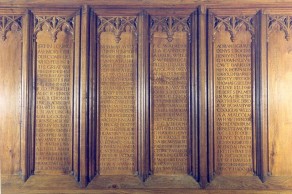
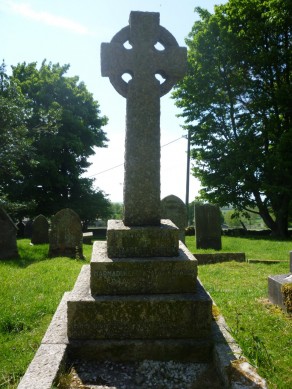
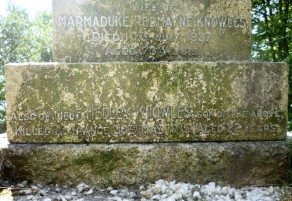



No comments yet.